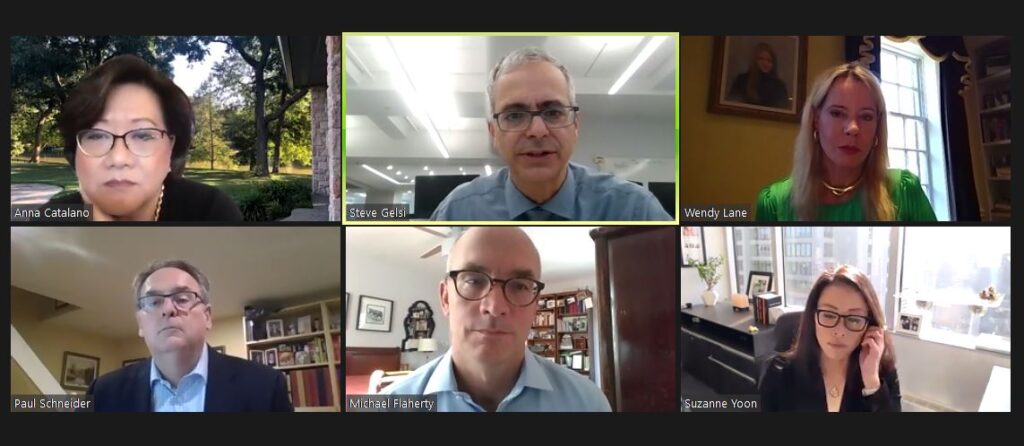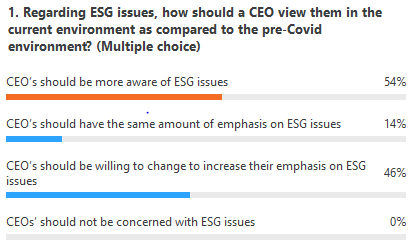November 2020
The Changing Role of the CEO

The CEO’s role and responsibilities have evolved significantly in recent years, but 2020 is a watershed in corporate leadership. CEOs are confronting a global pandemic, an invigorated public conversation about racial injustice and inequality, and a fluctuating economy, all while managing government lockdown rules and remote work.
On Nov. 16, The Deal’s Corporate Governance virtual conference kicked off with a panel titled: “The Changing Role of the CEO: From Business Leader to Corporate Ally and Social Activist.” The panel featured two veteran board directors, Anna Catalano and Wendy Lane; Paul Schneider of Ontario Teachers Fund; Suzanne Yoon of Kinzie Capital Partners; and Michael Flaherty, a senior vice president at Gladstone Place Partners. The conversation touched on several factors impacting the current role of the CEO, including shifting board dynamics, the amplification of issues on social media, the role of ESG, and communicating with Gen Z and millennials in the labor force.
Below are insights shared by the panelists during the hour-long session. A replay is available here.
On How CEOs Are Addressing Stakeholder Concerns
“It’s been one of the most difficult years for CEOs and for boards, as well as the most exciting,” said Anna Catalano, whose many directorships include serving on the boards of Holly Frontier, Kraton Corp., and Frontdoor. “It’s an issue of having to wear many different hats and understand the motivations of many audiences - 24/7 communication.”
“Everything is just heightened … CEOs are barraged by questions on all these topics. How do you decide what to engage with?” asked Wendy Lane, whose many directorships include serving on the boards of Willis Towers Watson, MSCI Inc. and Al-Dabbagh Group Holding Company. Lane added that some CEOs have prioritized engagement with their employee base, and others, their customers.
On the Importance of CEO Communication
“When CEOs communicate, it has to be authentic,” said Paul Schneider of the Ontario Teachers’ Pension Plan, adding that CEOs need to be in contact with all stakeholders so that they have an understanding of where people are coming from. “You have to tell your story, and tell it clearly.”
“People are looking for CEOs to not just be business leaders, but social leaders,” said Suzanne Yoon, of Kinzie Capital Partners. CEOs need to have a good relationship with their communities and make sure they’re giving back. “Communications plans in this respect are key,” she said.
“2020 reminded us why God gave us two ears and one mouth. Corporate communications used to be about the output. The higher you go in the company, the more time you need to spend listening,” said Anna Catalano. “CEOs have to surround themselves with people that will tell them the truth.”
On balancing the short-term social media response to an issue with the long-term goals of the company, Paul Schneider said: “It is important to set the expectations of the marketplace and drive the narrative. You need a CEO that listens, and their ego isn’t such that you can’t tell them bad news.
On Heightened Focus of ESG in the Age of COVID-19

“ESG has been a topic for years, and in March, all these issues came to the fore,” said Michael Flaherty, senior vice president at Gladstone Place Partners. Issues like executive compensation and furloughs can be incredibly thorny, “especially if you’re saying one thing and doing the other.”
“You want CEOs to change their businesses, you don’t want myriad people out of work,” said Wendy Lane, referring specifically to the divestment campaigns that have targeted companies out of favor with ESG principles. “You don’t want to put these firms out of work that actually have a path to ‘enlightenment’.”
On the Role of Millennials in CEO Communications
“This is a generation now that is going to be the key spenders in the next decade,” said Suzanne Yoon, noting that there are 85 million tax-paying millennials – significantly more than other generations. And, she pointed out, millennials are also in the C-suite.
They are “making an impact, and the generational factor in C-suites and on boards is changing the conversation,” said Anna Catalano. While millennials aren’t weighing in heavily yet on how companies report earnings, they will down the road, she said.
Millennials matter because they’re your employees and your investors, said Michael Flaherty, “If you’re a CEO and you’re not paying attention to a key issue coming up from the employee base, you could be caught by surprise.”